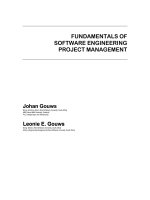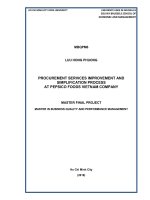final project software engineering
Bạn đang xem bản rút gọn của tài liệu. Xem và tải ngay bản đầy đủ của tài liệu tại đây (440.17 KB, 12 trang )
<span class="text_page_counter">Trang 1</span><div class="page_container" data-page="1">
VIETNAM GENERAL CONFEDERATION OF LABOUR
<b>TON DUC THANG UNIVERSITY FACULTY OF INFORMATION TECHNOLOGY</b>
<b>Final Project</b>
<b>Software Engineering</b>
<i>Advised by: </i><b>MSc NGUYEN NGOC PHIEN</b>
<i><b>Student: HUYNH THINH HUNG – 522H0023</b></i>
<b>DUONG NHUT KHUONG – 522H0014NGUYEN NGOC THIEN – 522H0047TRAN THI YEN PHUONG – 522H0084PHAN THIET TRUNG – 522H0071</b>
<b>Course : 26</b>
</div><span class="text_page_counter">Trang 2</span><div class="page_container" data-page="2">VIETNAM GENERAL CONFEDERATION OF LABOUR
<b>TON DUC THANG UNIVERSITY FACULTY OF INFORMATION TECHNOLOGY</b>
<b>Final Project</b>
<b>Software Engineering</b>
<i>Advised by: </i><b>MSc NGUYEN NGOC PHIEN</b>
<i><b>Student: HUYNH THINH HUNG – 522H0023</b></i>
<b>DUONG NHUT KHUONG – 522H0014NGUYEN NGOC THIEN – 522H0047PHAN THIET TRUNG – 522H0071TRAN THI YEN PHUONG – 522H0084</b>
<b>Course : 26</b>
</div><span class="text_page_counter">Trang 3</span><div class="page_container" data-page="3">We extend our sincere appreciation to MSc. Nguyen Quoc Binh for his expert guidance and steadfast support during the crafting of this report. His extensive knowledge and insights have significantly enhanced our understanding and methodology in the study of Software Engineering. We are profoundly thankful for his dedication, patience, and the considerable time he has devoted to us.
</div><span class="text_page_counter">Trang 4</span><div class="page_container" data-page="4"><b>THE PROJECT WAS COMPLETED AT TON DUC THANG UNIVERSITY</b>
I hereby declare that this is my project product and is guided by MSc. Nguyen Ngoc Phien;. The research content and results in this essay are honest and have not been published in any form before. The data in the tables for analysis, comments, and evaluation were collected by the author from different sources and clearly stated in the reference section.
In addition, the essay also uses a number of comments, assessments as well as data from other authors and other organizations, all with citations and source notes.
If any fraud is discovered, I will take full responsibility for the content of my essay. Ton Duc Thang University is not involved in copyright violations caused by me during the implementation process (if any).
<i>Ho Chi Minh city, 14 April 2024<small>th</small></i>
<i>The author(Sign and write full name)</i>
<i>Huynh Thinh Hung</i>
</div><span class="text_page_counter">Trang 5</span><div class="page_container" data-page="5"><b>INSTRUCTOR VERIFICATION AND EVALUATION SECTION</b>
<b>Confirmation from the instructor</b>
Ho Chi Minh city, <i>, 12 May 2024<small>th</small></i> (Sign and write full name)
<b>The teacher's evaluation part marks the test</b>
Ho Chi Minh city, <i>, 12 May 2024<small>th</small></i>
</div><span class="text_page_counter">Trang 6</span><div class="page_container" data-page="6"><b>SUMMARY</b>
</div><span class="text_page_counter">Trang 7</span><div class="page_container" data-page="7"><b>1.4.Terms, Acronyms, and Abbreviations...10</b>
<b>2.Project Management Plan...11</b>
<b>2.1.Project Organization...11</b>
<b>2.2.Lifecycle Model Used...11</b>
<b>2.3.Risk Analysis...11</b>
<b>2.4.Hardware and Software Resource Requirements...11</b>
<b>2.5.Deliverables and Schedule...11</b>
<b>2.6.Monitoring, Reporting, and Controlling Mechanisms...11</b>
<b>3.1.Stakeholders for the system...11</b>
<b>3.2.Use case model...11</b>
</div><span class="text_page_counter">Trang 8</span><div class="page_container" data-page="8"><b>3.2.1.1. Use case Register...11</b>
<b>3.2.2. Usecase Description for each use case...11</b>
<b>4.3.Technology, software, and hardware used...11</b>
<b>4.4.Rationale for your architectural style and model...11</b>
<b>5.Design... 12</b>
<b>5.1.Database design...12</b>
<b>5.2.Static model – class diagrams...12</b>
<b>5.3.Dynamic model – sequence diagrams...12</b>
<b>5.4.Rationale for your detailed design model...12</b>
<b>5.5.Traceability from requirements to detailed design model...12</b>
<b>6.Test Plan... 12</b>
<b>7.1.Requirements/specifications-based system level test cases...12</b>
<b>7.2.Traceability of test cases to use cases...12</b>
<b>7.3.Techniques used for test generation...12</b>
<b>7.4.Assessment of the goodness of your testsuite...12</b>
<b>7.Demo... 12</b>
</div><span class="text_page_counter">Trang 9</span><div class="page_container" data-page="9">This being a Desktop based application is very easy to access. Data and Records are managed in centralized database. Data is secureand easy to retrieve, store, and analysis, so chances of
muscalculations and occurance of error are very less.
<b>1.1.2. Scope</b>
This system will help to manage and run the coffee shop systematically. In this management system, we will provide an app that can be used by cafe’s employee to take order. So that the owner of shop can evaluates the whole system. This will ultimately lead to hire less waiters and create an opportunity to appoint more chefs and better shop to serve coffee faster. Employee can take payment which will managed into the software.
The Coffee Shop Management System is a comprehensive software solution designed to automate and manage the various
</div><span class="text_page_counter">Trang 10</span><div class="page_container" data-page="10">operations of a coffee shop. Developed in C#, a modern, object-oriented programming language, this system provides a user-friendly interface androbust backend functionalities.
<i>Technical Overview:</i>
The Coffee Shop Management System is developed in C#, leveraging the .NET framework’s power and flexibility. It uses a SQL Server database to store and manage data, ensuring high performance andsecurity. The system follows the Model-View-Controller (MVC) architecture, promoting organized and efficient code structure.
<b>1.3. Structure of the Document</b>
In this document:
<b>1.4. Terms, Acronyms, and Abbreviations</b>
Database An organized collection of data stored and accessed electronically from a computer systemClass Diagram A class diagram is a structural diagram that
describes the structure of a system by showing the system's classes, their properties, operations, and relationships between objects.
Usecase Diagram A use case diagram is a graphical depiction of a user's possible interactions with a system.Activity Diagram An activity diagram is a behavioral diagram to
describe the dynamic aspects of a system.ERD Entity Relationship Diagram
</div><span class="text_page_counter">Trang 11</span><div class="page_container" data-page="11">








